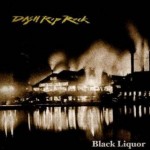Behind Dash Rip Rock’s party-band exterior has always been a dead serious Southern rock group kicking to get out. The last two Dash albums, Country Girlfriend and Call of the Wild, were big fun, but both tended to emphasize the humorous side of the band, the side that produced the ’90s college-radio hit “Let’s Go Smoke Some Pot.” Buy on AmazonBuy on iTunesBlack Liquor is one of the few Dash albums with almost no yuks on it, but it’s anything but a somber affair: Sporting some of Bill Davis’ hardest-hitting songs—and boosted by the best production the band’s had since its early-’90s alliance with the late Jim Dickinson—this is the album where the band rocks out in earnest.
From the start, the album isn’t afraid to sound huge: The title track (about paper-mill pollution, not alcohol) charges out with an arena-ready guitar riff and perfectly appropriate cowbell. A relative epic at four minutes, “Dirt” is as heavy/swampy as the band’s ever gotten, with Davis allowing himself some guitar heroics and an ominous spoken bridge. “Voodoo Doll” makes good on the band’s longstanding Creedence leanings, “Go Ahead Baby” on its love for gonzoid rockabilly. And the closing “Anvil or Hammer” wraps all of Dash’s classic rock tendencies into one number, complete with talkbox guitar.
As songwriters, Davis and occasional lyric collaborator Cheryl Wagner throw plenty of tweaks in the familiar Dash formula, including the band’s first French lyric (“Beck Moi Tchew,” which is either hardcore punk, Cajun style or vice versa). If the ecological/protest tone of the three opening numbers is a surprise, even more so is “In This World” one of the few outright love songs in the Dash catalogue. It’s a sneaky one though, getting in a couple of lowdown verses about why the world generally sucks, before the warmer bridge (“In this mean old world I found you”) reveals the song’s true colors. The lustier slant on “Touch of You” finds the band in more familiar territory.
There’s plenty of fuel here for Dash’s live show, but this time they’ve used the studio for all its worth. And it’s one of the few cases where a band’s 17th album just might be its best.





